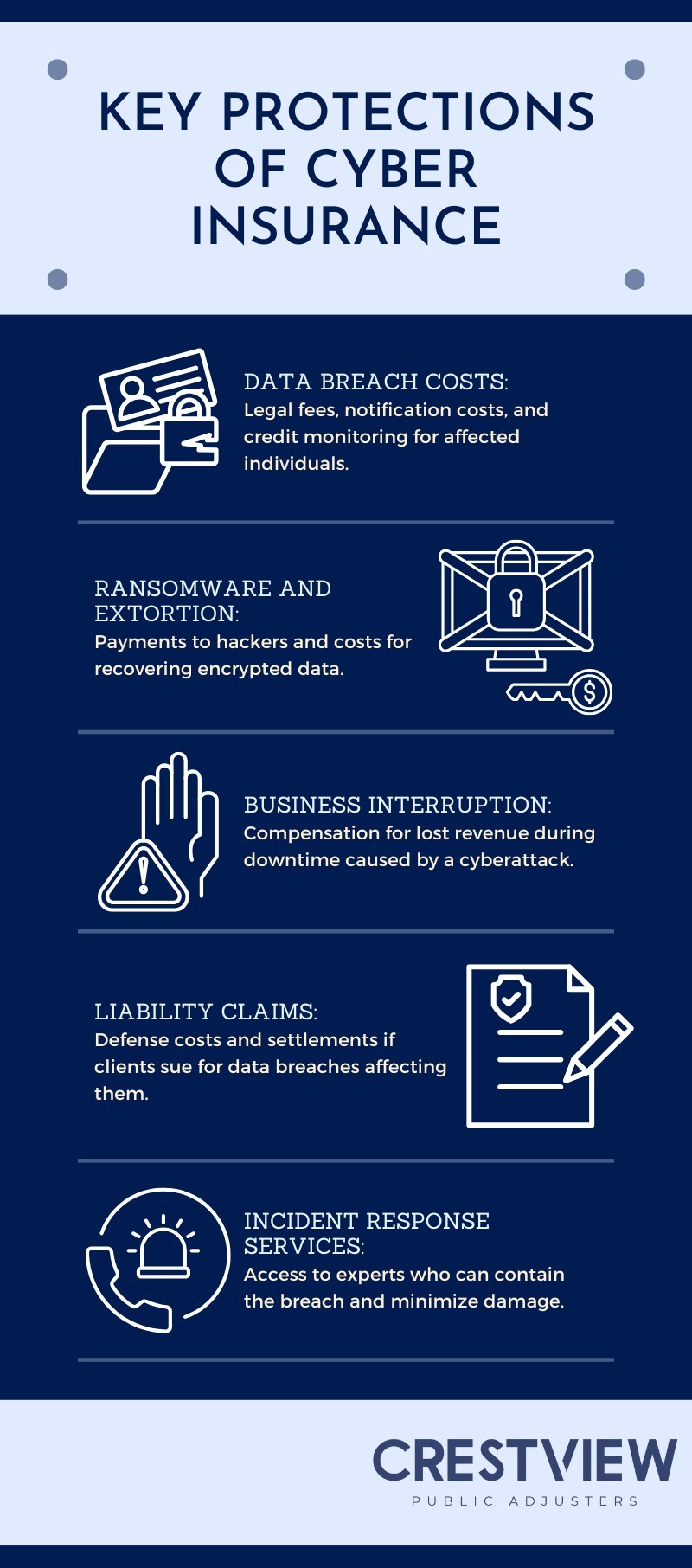Key Points:
- Cyber insurance protects businesses from financial losses due to cyberattacks, data breaches, and other digital threats.
- Industries handling sensitive data—like healthcare, finance, and retail—benefit the most from cyber insurance.
- Small businesses are increasingly targeted by hackers and often need coverage to manage the rising risks.
Cyber insurance is essential for businesses and individuals relying on technology to manage sensitive data. It protects against cyberattacks, data breaches, financial losses, and reputational harm. Companies that handle customer information, such as healthcare providers, retailers, and financial institutions, are especially at risk and can benefit from this coverage.
Even small businesses, often targeted by cybercriminals, need protection to cover recovery costs and liability claims. Whether you’re a freelancer managing client data or a corporation handling complex transactions, cyber insurance provides peace of mind and financial security in today’s digital landscape.
Understanding Who Needs Cyber Insurance
In 2023, cybercrime caused global damages exceeding $8 trillion, with businesses of all sizes increasingly becoming victims. The financial and reputational costs of a data breach or ransomware attack can cripple an organization, especially those without robust risk management strategies. Cyber insurance offers a safety net, providing financial and operational support during and after an incident.
Who needs cyber insurance? Organizations that store sensitive data, conduct business online, or rely heavily on technology to operate. This coverage is essential for safeguarding your business against rising digital threats. Whether you’re a small business or a multinational corporation, cyber insurance is not just a luxury—it’s a necessity in today’s digital economy.
Why Is Cyber Insurance Important?
The shift to digital-first operations has made cyberattacks a daily reality for businesses. While cybersecurity measures like firewalls and antivirus software provide some protection, no system is foolproof. A single breach can result in devastating costs:
- Financial losses: Legal fees, regulatory fines, and ransom payments can quickly add up.
- Operational downtime: Cyberattacks often force businesses to halt operations, leading to revenue loss.
- Reputational damage: Losing customer trust can impact future revenue and client relationships.
Cyber insurance steps in to cover these costs, allowing businesses to recover faster and mitigate long-term impacts. It also provides resources like incident response teams and legal support, ensuring you’re not navigating a crisis alone.
Which Industries Need Cyber Insurance the Most?
While every business faces cyber risks, certain industries are more vulnerable due to the nature of the data they handle.
1. Healthcare
The healthcare industry stores vast amounts of sensitive patient information, making it a prime target for hackers. A breach can compromise personal health records and lead to significant regulatory fines under laws like HIPAA.
2. Finance
Banks, investment firms, and insurance companies process billions of dollars in transactions daily. A cyberattack in this sector can disrupt financial systems and erode public trust.
3. Retail and E-commerce
Retailers handle credit card details and personal customer data, making them attractive to cybercriminals. Point-of-sale breaches and phishing attacks are common in this sector.
4. Small and Medium-Sized Enterprises (SMEs)
SMEs may not think they’re targets, but attackers often view them as low-hanging fruit due to weaker cybersecurity measures. Cyber insurance helps level the playing field, providing resources that smaller businesses often lack.
What Does Cyber Insurance Cover?
Cyber insurance policies vary, but most include coverage for:

Selecting a policy requires evaluating the specific risks your business faces and making sure the coverage matches those potential threats.
Do Small Businesses Need Cyber Insurance?
Absolutely. Small businesses are increasingly targeted by cybercriminals due to their limited defenses. According to recent data, 43% of cyberattacks target small businesses, yet only 14% are prepared to defend against them.
Why Small Businesses Are Vulnerable:
- Fewer resources for cybersecurity.
- Lack of employee training on phishing and scams.
- Greater reliance on third-party vendors.
Cyber insurance provides much-needed protection, covering costs that might otherwise force a small business to close its doors.
How to Choose the Right Cyber Insurance Policy
Selecting the right cyber insurance policy requires understanding your business’s unique risk profile. Here are a few steps to guide your decision:
1. Conduct a Risk Assessment
Identify the types of data you handle and the systems critical to your operations.
2. Review Coverage Options
Not all policies are created equal. Look for comprehensive coverage that includes first-party (your losses) and third-party (claims from others) protections.
3. Understand Policy Limits and Exclusions
Some policies may exclude certain events like state-sponsored attacks. Read the fine print carefully.
4. Consult an Expert
Working with a public adjuster or insurance broker can help you navigate the complexities of cyber insurance and ensure you’re adequately covered.

Protect Your Business from Digital Threats
Cyber insurance is no longer optional in today’s interconnected world. Whether you operate a small business or a large enterprise, this coverage offers vital financial protection and peace of mind. The question isn’t “Who needs cyber insurance?” but rather, “Can you afford to operate without it?”
Safeguard Your Cyber Claims with Crestview
At Crestview, we specialize in helping policyholders navigate cyber claims effectively. As experienced public adjusters in New York, we advocate for you, ensuring you receive the maximum compensation from your insurance policy. Protect your business from the unexpected—contact Crestview today and let us handle the complexities of your cyber insurance claims.

